八年级英语下学期lesson63(1)
Unit8Lesson63教案(1)
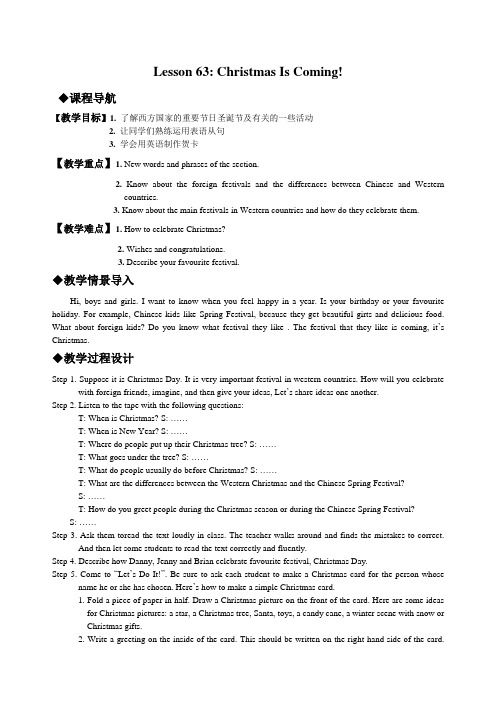
Lesson 63: Christmas Is Coming!◆课程导航【教学目标】1. 了解西方国家的重要节日圣诞节及有关的一些活动2. 让同学们熟练运用表语从句3.学会用英语制作贺卡【教学重点】1. New words and phrases of the section.2. Know about the foreign festivals and the differences between Chinese and Westerncountries.3. Know about the main festivals in Western countries and how do they celebrate them.【教学难点】1. How to celebrate Christmas?2. Wishes and congratulations.3. Describe your favourite festival.◆教学情景导入Hi, boys and girls. I want to know when you feel happy in a year. Is your birthday or your favourite holiday. For example, Chinese kids like Spring Festival, because they get beautiful girts and delicious food. What about foreign kids? Do you know what festival they like . The festival that they like is coming, it’s Christmas.◆教学过程设计Step 1. Suppose it is Christmas Day. It is very important festival in western countries. How will you celebrate with foreign friends, imagine, and then give your ideas, Let’s share ideas one another.Step 2. Listen to the tape with the following questions:T: When is Christmas? S: ……T: When is New Year? S: ……T: Where do people put up their Christmas tree? S: ……T: What goes under the tree? S: ……T: What do people usually do before Christmas? S: ……T: What are the differences between the Western Christmas and the Chinese Spring Festival?S: ……T: How do you greet people during the Christmas season or during the Chinese Spring Festival?S: ……Step 3. Ask them toread the text loudly in class. The teacher walks around and finds the mistakes to correct.And then let some students to read the text correctly and fluently.Step 4. Describe how Danny, Jenny and Brian celebrate favourite festival, Christmas Day.Step 5. Come to “Let’s Do It!”. Be sure to ask each student to make a Christmas card for the person whose name he or she has chosen. Here’s how to make a simple Christmas card.1. Fold a piece of paper in half. Draw a Christmas picture on the front of the card. Here are some ideasfor Christmas pictures: a star, a Christmas tree, Santa, toys, a candy cane, a winter scene with snow or Christmas gifts.2. Write a greeting on the inside of the card. This should be written on the right-hand side of the card.The greeting will say:Merry Christmas!Happy New year!Explain to students that usually these good wishes are combined because Christmas and New Year’s fall so close together.Step 6. Homwrok, Give a report about how to celebrate your birthday.◆课堂板书设计Lesson 63: Christmas Is Comingdecorate/decoration Germany under without tentby the wayput upThat’s why people say “Merry Christmas and Happy New Year” on their Christmas card.◆作业1. Finish the remaining exercises in the activity book.2. Preview the next reading in the student book.3. Write a composition introducing your favourite festival, Spring Festival.●教学反思在合理利用已有的课本教学资源的基础上,根据课程标准中对学生年龄特点、知识结构、认知能力、不同年级的阅读速度、阅读量的要求,购买符合本校特点并具有新课程理念的阅读教材,或者广泛收集贴近学生实际生活、贴近学生实际生活,具有时代特点,内容健康、丰富的阅读资源自编阅读材料。
Unit8 Save Our World lesson63-64课件(冀教版八年级下)
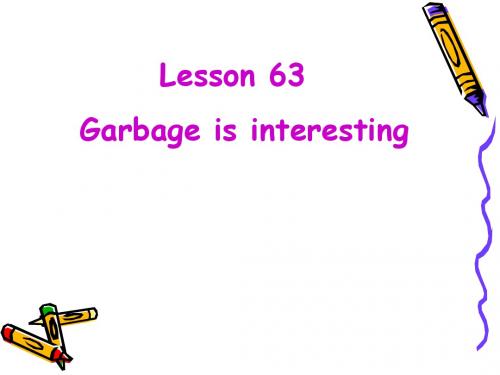
8. I think you are talkingabout the relay race now. (talk) __________ were 9. I didn’t know whom the letters _________ from. (be)
Finish off the exercises on page 79 and 80.
Lesson 63
Garbage is interesting
Learning aims : 1.Master the new words and phrases : take a walk seat lid clean-up 2.Writing practice
The man is walking with his dog by the sea .He is taking a walk . They’re taking a walk ,too. Isn’t it very interesting ?
4.be recycled 再利用
5.make out of 把…制成
Writing practice (Homework)
Send an e-mail back to Jenny .
Tell her what you do with the
garbage at home .
it would be better if you can give her some other ideas about
Exercises:按要求给出的形式 worst less 1.bad _____ (最高级) 2.little______(比较级) fixes touches 3.fix______(单三) 4.touch_______(过去分词)
冀教版八年级英语下册63课导学案
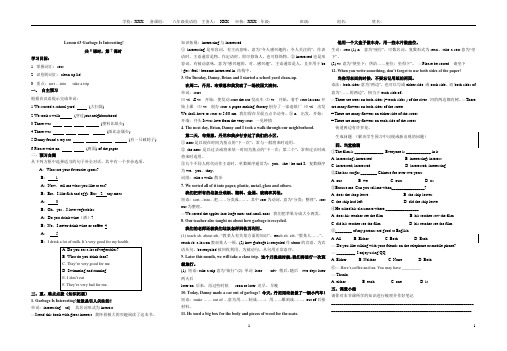
学校:XXX 备课组: 八年级英语组 主备人: XXX 审核:XXX 年级: 班级: 组名: 姓名:11Lesson 63 Garbage Is Interesting!共8课时,第7课时学习目标: 1. 掌握词汇:seat2. 识别的词汇:clean-up lid3. 重点:sort …into take a trip 一、 自主预习根据首汉语提示完成单词:1.We started a school yard (大扫除).2.We took a walk (穿过)our neighbourhood.3.There was (塑料比纸少).4.There was (纸比金属少) .5.Danny found a toy car (有一只破轮子) .6.Please write on (两面) of the paper . 二、预习自测从下列方框中选择适当的句子补全对话,其中有一个多余选项。
A :What are your favourite sports?B : 1A :Now ,tell me what you like to eat?B :Err ,I like fish and eggs. But 2 any meat. A : 3B :Oh ,yes ,I love vegetables. A :Do you drink wine (酒)? B :No ,I never drink wine or coffee. 4 A : 5B :I drink a lot of milk. It’s very good for my health.三、重、难点点拨(知识拓展)1. Garbage Is Interesting!垃圾是引人关注的! 单词:interesting adj. 其名词形式为interest—I read this book with great interest. 我怀着极大的兴趣阅读了这本书。
八年级英语下册 Unit8 Lesson 63教案 冀教版
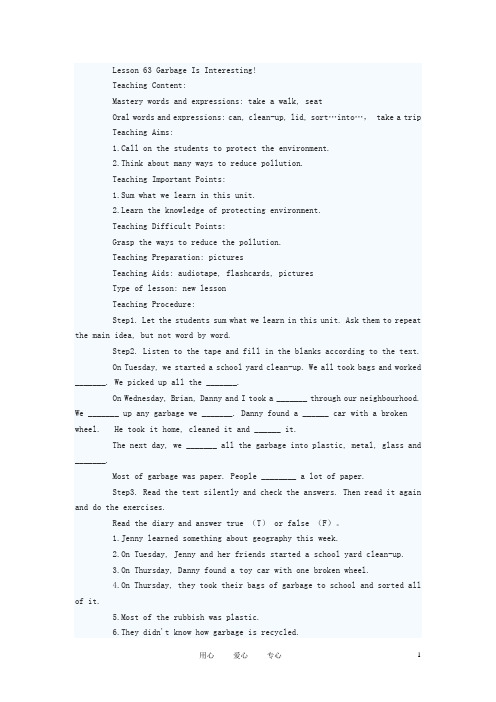
Lesson 63 Garbage Is Interesting!Teaching Content:Mastery words and expressions: take a walk, seatOral words and expressions: can, clean-up, lid, sort…into…, take a tripTeaching Aims:1.Call on the students to protect the environment.2.Think about many ways to reduce pollution.Teaching Important Points:1.Sum what we learn in this unit.2.Learn the knowledge of protecting environment.Teaching Difficult Points:Grasp the ways to reduce the pollution.Teaching Preparation: picturesTeaching Aids: audiotape, flashcards, picturesType of lesson: new lessonTeaching Procedure:Step1. Let the students sum what we learn in this unit. Ask them to repeat the main idea, but not word by word.Step2. Listen to the tape and fill in the blanks according to the text.On Tuesday, we started a school yard clean-up. We all took bags and worked _______. We picked up all the _______.On Wednesday, Brian, Danny and I took a _______ through our neighbourhood. We _______ up any garbage we _______. Danny found a ______ car with a broken wheel. He took it home, cleaned it and ______ it.The next day, we _______ all the garbage into plastic, metal, glass and _______.Most of garbage was paper. People ________ a lot of paper.Step3. Read the text silently and check the answers. Then read it again and do the exercises.Read the diary and answer true (T) or false (F)。
冀教版八年级英语下63课导学案

Lesson 62 Confidence★学习目标(知识目标)掌握词汇及短语finger,both,himself,because of等。
(能力目标)学习表达自己能力和自信的词汇,短语和句子。
(情感目标) 培养学生的自信心及对未来的一种积极态度。
★本课重点:词汇、句型、语言点★本课难点:表达自信的句型和词组[课前预习?快乐体验]一、请写出下列单词的同音词,这些单词你都能准确的区分开吗?1.write_______2.knew________3.there_______4.no______8.too_______5.wear______6.here________7.aren’t_____二、试着将下列段短语英汉互译。
1.站在讲桌前面___________________2.感到伤心___________________3.由于你的拼写___________________ 4一张试卷__________________5. 红圆圈___________________6.与……不同……_________________7.对…有信心_________________ 8.提高他的拼写能力___________________三、考考你的课文理解,请根据课本P77的课文内容选择正确答案完成下1.Peter stood ___ when his teacher talked to him.A.at his deskB.inthe front of the teacher’s deskD.at the back of the classroomC.in front of the teacher’s desk2.What are around many of the words Peter wrote?.A mark crossing. B.A square. C.Some black circles. D.Some red circles.3.The word “____”was spelled “bot”by Peter.A.boughtB.butC.broughtD.boilt四、[课堂讲解·日积月累]1.It’s beause of your spelling.那是你的拼写问题。
八年级英语下学期lesson-63a
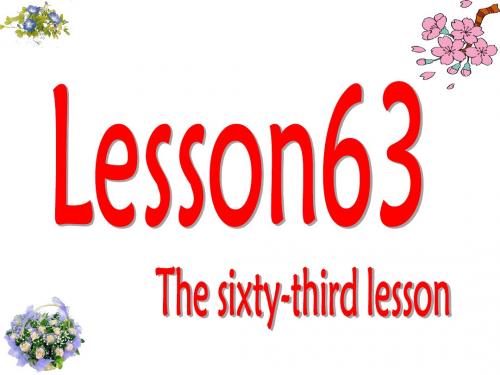
5. -- Can John look after himself? --No, he can’t . He’s only five. 6. I can’t find my cat. Can you help me? 7. -- May I have a big piece of bread? --Yes, here you are. Can 8. –Where’s Li Ping? --He may be in the teacher’s office, but I’m not sure. 9. Don’t smoke here. It can be dangerous. 10. May you be happy!
①Where can they be now? ②They may go home now.
1. 遇到下列情况,只能用can。
1)表示能力,意为“能,会”。如: Can you spell it?
2. 在表示祝愿祈求时,只能用may。 如: May you succeed(成功)!
相同点:
1. can和may都是情态动词V情+V原 2. can和may都可表示请求许可,译作“可以”。(可互换) 3. can和may都可以表示可能性,一般说来,can多用于疑 问句和否定句,而 may则多用于陈述句(肯定句)。
watch a play on TV
在电视里
• A:What is he going to do tonight? • B:He is not sure. He may ….
go to the library to borrow books
What books can you borrow from the library?
英语:Unit-8-《Save-Our-World》lesson63-64综合课件(2)(冀教版八年级下)
Lesson 64 Mainly revision
Learning aim:
1.New words :sent,litter,bad,more,most,re pair,touch,must,mend,percent,weight ,metal,sort,toilet,fix, waste , less, take out, least, bag, throw away, environment,pick up,rubbish,yard,a bit of
Isn’t it very interesting ?
Where do you sit ? Do you have a good seat
in the classroom ?
a seat
Let’s imagine !
Have you seen a car like this ? ?
The body of the car is a box ,the wheels of it are plastic lids ,the seats are pieces of wood .
Danny made the car out of garbage .He is clever !
Read the e-mail in Lesson 63 and try to understand the meaning of it.Then finish off the exercises.
Phrases : 1.take a walk 散步
2.Grammar:Object Clause (1)
3.Topic:Offering help .
Exercises:按要求给出的形式
1.bad _w_o_r_s_t (最高级) 2.little__le_s_s__(比较级) 3.fix_f_i_xe_s__(单三) 4.touch_t_o_u_ch_e_s_(过去分词) 5.we_o_u_r_se_l_v_es(反身代词) 6.waste_w__a_st_e_(动词) 7.leak_l_e_a_k_y_(形容词) 8.much_m__o_r_e_(比较级) 9.exact_e_x_a_c_tl_y (副词) 10. repair__fi_x__(同义词) _m_e_n_d_(同义词) 11.rubbish_g_a_r_b_a_ge_ (同义词) 12.tear__to_r_e_(过去式)13.reuse_r_e_u_sa_ble(形容词)
八年级英语下册 Unit8 Lesson 63教案 冀教版
冀教版英语八年级下册Unit8 Lesson 63教案Lesson 63 Garbage Is Interesting!Teaching Content:Mastery words and expressions: take a walk, seatOral words and expressions: can, clean-up, lid, sort…into…, take a tripTeaching Aims:1.Call on the students to protect the environment.2.Think about many ways to reduce pollution.Teaching Important Points:1.Sum what we learn in this unit.2.Learn the knowledge of protecting environment.Teaching Difficult Points:Grasp the ways to reduce the pollution.Teaching Preparation: picturesTeaching Aids: audiotape, flashcards, picturesType of lesson: new lessonTeaching Procedure:Step1. Let the students sum what we learn in this unit. Ask them to repeat the main idea, but not word by word.Step2. Listen to the tape and fill in the blanks according to the text.On Tuesday, we started a school yard clean-up. We all took bags and worked _______. We picked up all the _______.On Wednesday, Brian, Danny and I took a _______ through our neighbourhood. We _______ up any garbage we _______. Danny found a ______ car with a broken wheel. He took it home, cleaned it and ______ it.The next day, we _______ all the garbage into plastic, metal, glass and _______.Most of garbage was paper. People ________ a lot of paper.Step3. Read the text silently and check the answers. Then read it again and do the exercises.Read the diary and answer true (T) or false (F)。
八年级英语下学期lesson-63a
①Where can they be now? ②They may go home now.
1. 遇到下列情况,只能用can。
1)表示能力,意为“能,会”。如: Can you spell it?
2. 在表示祝愿祈求时,只能用may。 如: May you succeed(成功)!
相同点:
1. can和may都是情态动词V情+V原 2. can和may都可表示请求许可,译作“可以”。(可互换) 3. can和may都可以表示可能性,一般说来,can多用于疑 问句和否定句,而 may则多用于陈述句(肯定句)。
1)表示能力只能用can ,意为“能,会”。 2) 在表示祝愿祈求时,只能用may。
பைடு நூலகம்
1.Shecan sing this song in English, too. 2.I can’t play with you, I’m doing my homework now. 3. ---Where is my watch? I can’t find it. --- It may be in your pocket. 4.--- May I borrow your bike? Can ---Sorry. I don’t have one. Ask Ann. She may have one.
5. -- Can John look after himself? --No, he can’t . He’s only five. 6. I can’t find my cat. Can you help me? 7. -- May I have a big piece of bread? --Yes, here you are. Can 8. –Where’s Li Ping? --He may be in the teacher’s office, but I’m not sure. 9. Don’t smoke here. It can be dangerous. 10. May you be happy!
八年级英语第63课导学案
6.There is a bird at the t_____ of the tree.
二.看看你的应变能力,用所给单词的适当形式填空。
1.Christmas Day is on December _______(twenty-five).
= The dictionary is placed on the bed.
5.I can reach the top of thep. “没有”
I have come out without any money.
6.Oh, and by the way, Merry Christmas and Happy New Year!
4. Teacher’s day________5.New Year’s Day________6.The Spring Festival ______
7.Women’s Day_________8.Mother’s Day_______9.Fsther’s Day______
10.Mid-Autumn Day______
(2)Know some western festervals
2.Make more chances to communicate with the others in English.
学习过程:(8分钟)
一,温故知新
(一)你能出下列节日的汉语意思吗?
1.Christmas day___________2.National day________3.Children’s day_______
decorate sth. with sth. “用……来装饰……”
We decorated the building with the flags
- 1、下载文档前请自行甄别文档内容的完整性,平台不提供额外的编辑、内容补充、找答案等附加服务。
- 2、"仅部分预览"的文档,不可在线预览部分如存在完整性等问题,可反馈申请退款(可完整预览的文档不适用该条件!)。
- 3、如文档侵犯您的权益,请联系客服反馈,我们会尽快为您处理(人工客服工作时间:9:00-18:30)。
You may / can go now.
--May I use your bike? --Yes,you may. /Sure./Certainly./Of course. --No,you mustn't / can’t.
A: Can I borrow these books? B: Certainly,you can keep them for two weeks.
borrow…from…借进
I borrowed a book fom her. He will borrow a pen from Lily. 他要从Lily那里借一支钢笔 lend…to…借出 She lent me a book.=She lent a book to me. Lily 会借一支钢笔给他 Lily will lend a pen to him.
3)can 还表示“能力” e.g. He can speak English.
I can swim.
4)may 还可表示祝愿与希望 e.g. May you succeed! May you be happy! 5) may be 与 maybe ( = perhaps )表示可能
作谓语
e.g.
=Maybe it is in your inside pocket.
--Ah, so it is.
的确如此
1.She is a student. He is a student. So is he She is a student. _______________. 2.--She is a student. Do you agree? So she is --I agree with you. ( _____________.) 3.She likes pizza. He likes pizza. So does he. She likes pizza. _____________. 4. -- She likes pizza. So she does - -I think so. (______________.)
作状语
He may be at home.=Maybe he is at home. They may know.=Maybe they know.
它可能在你的书桌里. It may be in your desk.
=Maybe it is in your desk.
Use “ may/ may be/ maybe” may be 1.The key to my bike _______in my bag. may 2.You _______have an accident if you play football on the road. 3._______ Maybe you are right and I _______ may be wrong. 4. I don’t know the way. Ask him. He may _______know. Maybe 5. _______he likes smoking. I’m not sure. may = He _______ like smoking. I’m not sure.
Can you help me to find it? (my geography book,my physics book,the history book,the key to my bike)
--I can’t find the key
to the bike.
--It may be in your inside pocket.
gas station
--May I smoke here? --No, you can’t. It can be dangerous.
--Be careful! You may
cut your finger.
Look out!=Take care! 小心
情态动词can与may
1)表示许可或请求 e.g. May / Can I smoke here?
-What are you going to do on May Day? - I’m not sure. I may go on a trip. =Maybe I will go on a trip.
Homework
1.Copy the new words. 2.Finish off the workbook. 3.Do the exercise like the following:
对may的否定回答,表示不准,不许的意思时,通常用must not或cannot来代替 may not. 2)“可能”表示推测(can / may / must) A: can (常用于否定和疑问句) --Can he be at home? --He can’t be at home.I saw him go out just now. B: may (常用于肯定句,可能性不大) --Please ask that man.He may know that. -- My mother may be at home. =Maybe my mother is at home. C: must (常用肯定句中,语气比肯定) e.g. There are lights on in their house,so they must be at home.
